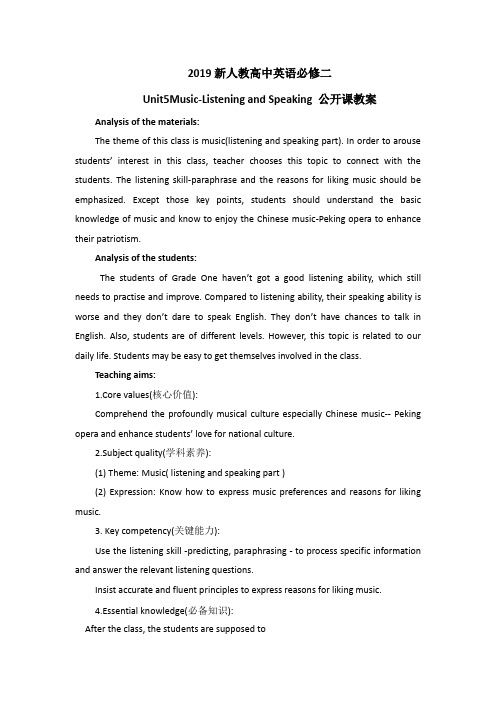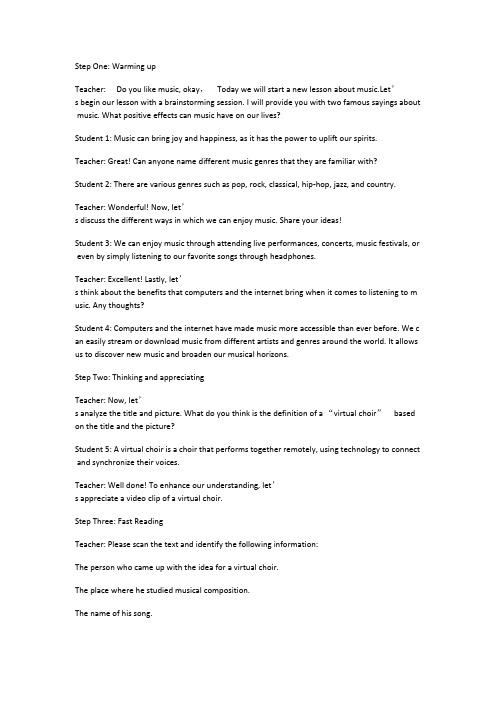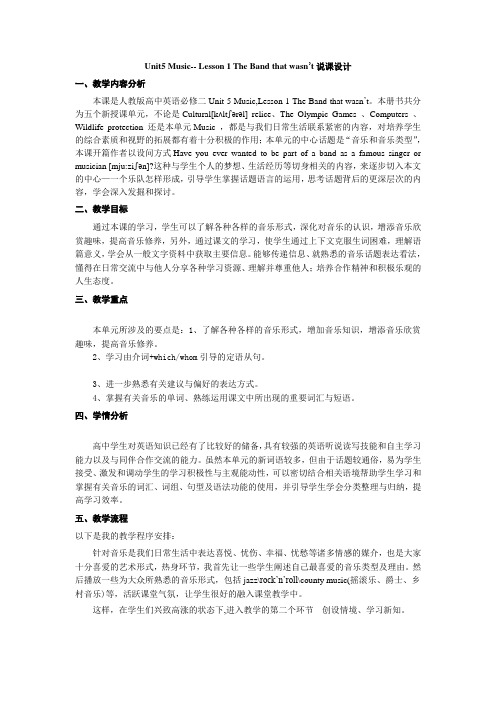人教版高中英语必修2Unit 5Music说课稿
1高中英语必修二unit5music说课稿列位老师

1 高中英语必修二unit5 music 说课稿列位老师:大家好!作为一名新课标下的英语老师,让学生愉快地、充满自信地走进我的英语课堂,是我最大的愿望,让学生在我的英语课堂上享受快乐和成功是我孜孜以求的。
连年来,我为实现自己的梦想和追求不懈地尽力着。
今天,借此平台,希望列位老师指导我的说课,是我加倍自信的完成老师的使命。
一、说教材内容和学情我说课的内容选自人教版普通高中课程标准实验教科书英语必修二第五单元。
本单元的话题是Music,它是中学生日常生活中比较感兴趣的话题之一。
它中心话题是“音乐”和“音乐类型”,单元的各项活动的设计都是围绕着以音乐类型和不同音乐对人的影响展开的。
而对于音乐和音乐家,这种学生感兴趣的话题、与切身相关的情节,很容易就会引发学生们的极大兴趣,因此他们学习的参与性和踊跃性也会较高。
在引导学生阅读前,让学生对不同种类的音乐的英文说法加以熟悉和理解,开阔的学生的视野。
而在阅读后,结合此刻学生中普遍存在的“选秀热”这一热点问题,引发学生的反思。
我的教学对象是高一学生。
高中生思想逐渐成熟,对美的追求和对成功的渴望也愈来愈强烈,因此课堂中除关注语言知识学习和语言技术训练外,更应该注重其心里的理解和个人对事物的观点。
二、三维教学目标按照《新课程标准》关于总目标的具体描述,结合高一学生实际,我把教学目标设定为以下几个方面:(一)知识目标和能力目标学习一些相关的单词、短语和句式,特别是关于音乐种类的辞汇和表达对音乐感受的词。
比如:动词prefer,feel,enjoy,appreciate,,形容词relaxed,sleepy,cheerful,energetic,lively。
能用英语表达建议、偏好和爱好。
2 学生熟悉掌握不同的音乐类型。
学会灵活运用课文中的句式,自如的表达自己对音乐的理解和感受,而且从更深一层上去把握不同音乐所表达的不同意义。
(二)情感态度1.熟悉各类音乐形式,了解音乐在人们生活中的重要性,提高音乐修养2.从谈论“音乐人的成功”入手使学生了解到做什么事都需要付出艰辛的努力。
人教版高中英语必修二Unit5 Music-Listening and Speaking教案

2019新人教高中英语必修二Unit5Music-Listening and Speaking 公开课教案Analysis of the materials:The theme of this class is music(listening and speaking part). In order to arouse students’ interest in this class, teacher chooses this topic to connect with the students. The listening skill-paraphrase and the reasons for liking music should be emphasized. Except those key points, students should understand the basic knowledge of music and know to enjoy the Chinese music-Peking opera to enhance their patriotism.Analysis of the students:The students of Grade One haven’t got a good listening ability, which still needs to practise and improve. Compared to listening ability, their speaking ability is worse and they don’t dare to speak English. They don’t have chances to talk in English. Also, students are of different levels. However, this topic is related to our daily life. Students may be easy to get themselves involved in the class.Teaching aims:1.Core values(核心价值):Comprehend the profoundly musical culture especially Chinese music-- Peking opera and enhance students’ love for national culture.2.Subject quality(学科素养):(1) Theme: Music( listening and speaking part )(2) Expression: Know how to express music preferences and reasons for liking music.3. Key competency(关键能力):Use the listening skill -predicting, paraphrasing - to process specific information and answer the relevant listening questions.Insist accurate and fluent principles to express reasons for liking music.4.Essential knowledge(必备知识):After the class, the students are supposed to⑴know the common types of music.⑴grasp one listening skill --- Paraphrase.⑴express music preferences and reasons for liking music⑴polish your reasons for liking Peking Opera simplyTeaching key and difficult points:1.Help students to get familiar with different kinds of music through listening practice and know the function of paraphrase in listening.2.Enable students to be aware of the function of paraphrase in listening.Teaching procedures:StepⅠLead-inActivity1 The teacher is advised to talk with their students about music festival.Boys and girls, before our listen, let’s work in pairs and discuss what music festival is.What would you like to do in the music festival? Share your ideas with partner.Activity 2 Look at the opening page and talk about it.1.What are they doing?2.Can you name some of the musical instruments that the performers are using?Suggested answers:1.They are performing classical music.2.Piano, violin, flute, drum, bagpipes, saxophone,etc.StepⅠListeningActivity 1 Warming upBefore listening,match the pictures with the correct types of music.A.Chinese traditionalB.classicalC.country musicD.hip-hopSuggested answers:1. B2.A3.C4.DActivity 2First listeningListen to the interviews and find out what kind of music the three students each like.1.The first student likes to .2.The second student likes to .3.The third student likes to .Suggested answers:1.listen to country music2.dance to hip-hop music3.play country musicActivity 3Second listeningThe reporter paraphrased some of the answers.Listen to the interviews again and complete the sentences with the words you hear.1.A:Country music touches my heart.B:So you like music that’s of ?2.A:When I listen to hip-hop,I just have to move!B:So it makes you want to ?3.A:Classical music makes me feel like I’m sitting beside a quiet stream and enjoying nature.B:So to you,it’s and ?Suggested answers:1.full of feelings2.want to dance3.peaceful and beautifulActivity 4Third listeningListen to the interviews again and think about the function of paraphrase inlistening.Suggested answers:1.to check if the listener’s understanding is correct.2.to show interest in what the speaker has said.StepⅠ SpeakingActivity 1 Enjoy some pieces of music and tell us your feelings.1.the first piece of music—played by a symphony orchestra2.the second piece of music—rock music3.the third piece of music—played by pipaSuggested answers:1.I like listening to music played by orchestras.I can hear things played on instruments from all of the different families—woodwinds,strings,percussion and brass.Also,classical music tends to be slower,so it makes me feel calm when I listen to it.2.Rock music lets me have a strong feeling,happy or sad.3.It brings me peace and beauty,letting me feel relaxed.Activity 2 Talk in pairs.Interview each other about e the pictures below for ideas.These expressions may help you.Reasonsforlikingmusictouchesmyheart/soulmakesmehappy/wanttodancegivesmeenergy/hope helpsmeexercise/studysoundspeaceful/beautifulremindsmeofhome/peopleIloveExample:A:What kind of music do you like?B:I like music played by saxophone.A:What makes it so special to you?B:Because it sounds peaceful and it often reminds me of someone I love.Suggested answers:A:What kind of music do you like?B:I like Chinese folk music,for example,pipa music.A:What makes it so special to you?B:I like to listen to it when I have leisure time.It brings peace and beauty to me,which makes me feel like I’m lying by a stream in a forest.StepⅣHomework1. After the class, write a short essay on your feelings of Peking opera and try to polish it.2.Do more practices to consolidate the important listening skill-paraphrase.板书设计Unit 5 Music1.Listening skill--ParaphraseReasons for liking music课后反思通过学习:1.学生学习英语的信心增强;2.学生学会抓住听力中的答案;3.锻炼学生的口语能力!通过本节内容学习,理解并讨论主题图,预测单元的主题和内容,通过问题链引导学生谈论单元内容,该板块以听为本,学生通过听取信息和选择依据来学习语言知识,同时内化所学关于本单元的内容。
高中人教版高中英语必修二unit5music音乐说课精品ppt课件

说课难点
难点
我们现在的高中学生,缺少的就是英语口语表达能力,所 以如何让学生开口用他们学到的知识谈论音乐以及相关的知识, 这是对学生语言表达能力的一种检测,也是本节课的难点。
教法
讨论式教学法
1
教法和学法
学法
1
小组合作法
合作式教学法 2
教法和学法
2
课堂讨论法
视听结合法
3
3
归纳法
教学程序
本课共45分钟,具体教学步骤如下:
说课稿
1、教学内容和学情 2、教学目标 3、教学重点击难添点加标题 4、教法和点击学添法加标题 5、教学程序 6、教学反思
提纲
一、说教材内容和学情
教材内容
我说课的内容是高中英语必修二第五单元warming up部分。英语学科中 warming up 部分的重要性:
(1)让学生初步了解本单元的内容。 (2)利用warming up 部分激起学生对本单元内容的兴趣。 (3)warming up部分的目的就是鼓励学生自由讨论,大胆思考,表达自己的见解。 (4)warming up 部分对促进学生主体参与课堂活动,促进学生的 创造性思维发展以及交 际能力有非常重要的作用。
第一步:Words .古典的,古典文艺的
Roll
v滚动; (使)摇摆
Rock ’n’ roll n.摇滚乐
rap
n.说唱乐
folk
adj. 民间的
Jazz
n. 爵士音乐
orchestra n.管弦乐队
choral
adj.唱诗班的,合唱队的
教学程序
教学程序 本课共45分钟,具体教学步骤如下:
教学程序 本课共45分钟,具体教学步骤如下:
高中英语必修二《Unit5Music》全英文说课稿

⾼中英语必修⼆《Unit5Music》全英⽂说课稿《Unit 5 Music》说课稿Good morning, professors, it’s my great pleasure to be here sharing my lessons with you. The content of the lesson is Senior English for China Student’s Book 2 Unit 5 Music. I’ll begin the lesson from the following five parts, the teaching material, the teaching methods, the studying methods, the teaching procedure and blackboard design. First, let me talk about the teaching material.Firstly,let me introduce the teaching material. This unit is to introduce to us different types of band. The reading passage is the center of this unit. It is made up of 4 paragraphs, that is, many people want to be famous as singers or musicians, form a band, Monkees began as a TV show and they became even more popular than the Beatles. The text is the most important teaching material in this lesson, which extends the main topic “music” and contains most of the vocabulary and grammar points that students should learn in this unit.Secondly, I want to tell something about the students. Although the students have the basic abilities of listening, speaking, reading, and writing, they still need many opportunities to practice what they have learned, to express their ideas, feelings, and experience and to develop their autonomous learning ability and cooperative learning abilityThirdly, I’d like to talk about teaching aims and demands1 Knowledge aims:(1)to help students to understand and master the words, phrases and sentence patterns.(2)to know some basic information about music2 Ability aims:(1) To improve the students’ organizing and using skills of English as thesecond language(2) To understand the main idea, to scan for the needed information and tograsp the details3 Emotional aims:(1) Help students understand different type of music and how to form aband(2) Develop students’ sense of cooperative learningFourthly, teaching key points is1. To help the students get a general idea of the whole passage, and some detailed information and language points as well.2. To understand how Monkees formed, developed and succeed.Teaching difficult points is1. The students use their own words to express their own ideas.2. the prep+ whom/which attribute clauseAccording to the analysis above, I’ll try to use the following theories to make students the real master of the class while the teacher myself the director.a. Communicative Language TeachingLa nguage is used for communication. It’s learner-centered and emphasizes communication and real-life situations.b. Task-based Language TeachingA task resembles activities which our students or other people carry out in everyday life, Learners should be givenopportunities to reflect on what they have learned and how well they are doing.c. Computer Assisted Language TeachingLanguage learning needs a context, which can help the learners to understand the language and then can product comprehensible output, so computer has the advantages to make the materials attractive.Part 3 Learning MethodsTask-based, self-dependent and cooperative learningPart 4 Teaching ProcedureStep One Lead-in“Interest is the best teacher.” Therefore, at the very beginning of the class, I should spark the students’ mind to focus on the centre topic “the band”. I’ll play some different type of music to attract their attention and then bring some questions. Question:What kind of music they like?Which band they know best?The answers must relate to band. After this, the students will be eager to know something about band and this is the very time to naturally lead the class into Step 2 Step 2 Reading for information: skimming and scanningIn this step, I use Task-based Language Teaching method, which can give students a clear and specific purpose while skimming and scanning the context.Task 1 General ideaThe students will be asked to just glance at the title and the pictures of the passage, and then guess what they will read in the text. And they’ll be divided into groups of four to have a discussion.The purpose is to inspire the students to read actively, not passively. In addition, the task is to develop the students’ reading skill by making prediction and to encourage the students to express their thoughts in English and cooperate with each other. Task 2 Main idea of each paragraphCooperative learning can raise the students’ interest and create an atmosphere of achievement. Based on this theory, I divide the whole class into 4 groups to skim the whole text and get the main idea of each paragraph.Step 3 Reading for comprehensionThe purpose of reading is to get the correct and useful information. Students should not only have a high speed of reading but also have a correct understanding of details. Therefore the following practices on Page 35 can help check the situation. Step 4 Solving difficult language problems through readingIt’s important for language learners to learn important rules of grammar and use these rules to solve problems in reality. In the previous process of reading, thestudents must come across some difficult language obstacles, so it’s necessary for us to discuss and explain. This period of time belongs to students. They can ask any questions they come across in the process of learning. I’ll explain the questions and difficulties. The purpose of this is improving the students “questioning spirit” and dealing with the difficulties.Step 5 ConsolidationLanguage is learnt by communicating. It is my job to create an atmosphere for students to use the language. Here I design 2 activities1 Reading for comprehensionI’ll ask 4 students to read each paragraph, and then do the exercise following the text. I think it’s a good way to review what they have learned.2 DiscussionDuring making discussion, the students will deepen their understanding of the main idea of the passage.a. Why Monkees can be successful? Give reasons.b. What’s the most important thing for a successful band? Why?Step 6 HomeworkAsk the students to write down sth about their favorite singers, band or music and list the reasons.The assignment enables the students to search various information resources, which can widen their view and continue to inspire their enthusiasm of learning.Part 5 Blackboard designUnit 4 MusicPassage The Band That Wasn’tTopic Sentences:1. Many people want to be famous as singers or musician2. Form a band3. Began as a TV4. They became even more famous than the BeatlesDiscussion:a. Why Monkees can be successful? Give reasons.b. What’s the most important thing for a successful band? Why?In my opinion, the blackboard design can reflect the teacher’s ability of mastering the text and leading the students to master the text easily.In this text, the design is not easy to write. I write the topic sentences on the blackboard, in order to tell the students that this is of the importance in this class. I want to make the design inductive, instructive and artistic.。
人教版必修第二册 Unit 5 music Reading and Thinking 英文说课稿

Step One: Warming upTeacher: Do you like music, okay,Today we will start a new lesson about music.Let’s begin our lesson with a brainstorming session. I will provide you with two famous sayings about music. What positive effects can music have on our lives?Student 1: Music can bring joy and happiness, as it has the power to uplift our spirits.Teacher: Great! Can anyone name different music genres that they are familiar with?Student 2: There are various genres such as pop, rock, classical, hip-hop, jazz, and country.Teacher: Wonderful! Now, let’s discuss the different ways in which we can enjoy music. Share your ideas!Student 3: We can enjoy music through attending live performances, concerts, music festivals, or even by simply listening to our favorite songs through headphones.Teacher: Excellent! Lastly, let’s think about the benefits that computers and the internet bring when it comes to listening to m usic. Any thoughts?Student 4: Computers and the internet have made music more accessible than ever before. We c an easily stream or download music from different artists and genres around the world. It allows us to discover new music and broaden our musical horizons.Step Two: Thinking and appreciatingTeacher: Now, let’s analyze the title and picture. What do you think is the definition of a “virtual choir”based on the title and the picture?Student 5: A virtual choir is a choir that performs together remotely, using technology to connect and synchronize their voices.Teacher: Well done! To enhance our understanding, let’s appreciate a video clip of a virtual choir.Step Three: Fast ReadingTeacher: Please scan the text and identify the following information:The person who came up with the idea for a virtual choir.The place where he studied musical composition.The name of his song.Student 6: Eric Whitacre came up with the idea for a virtual choir. He studied musical compositio n at the Juilliard School. His song is called “Lux Aurumque.”Teacher: Excellent job! You have successfully grasped the key information from the text.Step Four: Reading & thinkingTeacher: Now, let’s delve deeper into the topic by completing a mind map based on the first paragraph.Students work on completing the mind map, exploring the concept and significance of a virtual c hoir.Teacher: Well done! Now, let’s engage in a discussion to analyze the advantages and disadvantages of being a member of a virt ual choir.Students discuss in groups and share their opinions, considering aspects such as flexibility, global collaboration, and potential challenges faced in a virtual setting.Teacher: Great discussions! For your homework, I would like you to reflect on whether a virtual c hoir truly brings people together and explain why or why not.Step Five: Careful Reading and ExerciseTeacher: Carefully read the text and ponder the reasons behind Eric’s successful creation of a virtual choir. Also, pay attention to the transition sentences that connec t different parts of the text.(Students read and contemplate independently, considering factors such as innovative use of t echnology, the ability to reach a wider audience, and the impact on artistic collaboration.)Step five: post-readingTeacher: Now, let’s discuss the reasons behind Eric’s success in creating a virtual choir. Share your thoughts and opinions, drawing from the text and your own insights. Who would like to start?Student 1: I believe Eric’s success can be attributed to his strong leadership and clear vision. He was able to inspire and g uide the participating singers towards a common goal, ensuring everyone understood their role i n the virtual choir.Teacher: That’s an excellent point! Eric’s leadership skills were instrumental in bringing together a diverse group of singers and fostering a sense of unity. Clear communication and guidance are essential in any collaborative project, es pecially in a virtual setting.Student 2: Another factor contributing to Eric’s success is his innovative use of technology. By utilizing video conferencing platforms and editin g software, he was able to connect and synchronize the voices of the singers, creating a seamless virtual choir experience.Teacher: Absolutely! Eric’s ability to embrace technology and leverage its potential played a crucial role in overcoming the physical barriers and bringing together singers from different locations. This showcases the powe r of technology in facilitating collaboration and artistic expression.Student 3: I think one of the reasons behind Eric’s success is the dedication and commitment of the participating singers. Despite the challenges o f recording their individual parts separately, they put in the effort to ensure the quality of their p erformances.Teacher: Well said! The dedication and commitment of the participating singers were indeed vita l in creating a cohesive virtual choir. Their individual efforts combined to produce a harmonious p erformance, showcasing the importance of individual contributions within a collective endeavor. Step six: summary and homeworkSummary: Let the students to summarize what they have learned today then the teacher sublima te it like this:Let the music heal the world! Music has the remarkable power to ignite passion and evoke emotions that transcend boundaries. It is a universal language that speaks to the core of o ur being, connecting people from different cultures, backgrounds, and experiences. In times of h ardship and despair, music has the ability to uplift our spirits, provide solace, and bring a sense of unity.When we immerse ourselves in the melodies and rhythms of music, we embark on a transformat ive journey. It has the potential to heal wounds, mend broken hearts, and bring forth feelings of j oy and happiness. Music has the ability to transcend language barriers, allowing us to express ou r deepest emotions and thoughts without the need for words.Moreover, music has the power to bridge gaps and foster understanding among diverse commun ities. It serves as a catalyst for dialogue, encouraging individuals to embrace cultural diversity and appreciate the richness of different musical traditions. Through music, we can celebrate our shar ed humanity and promote peace and harmony in a world that often feels divided.As we navigate the challenges of the world, let us turn to music as a source of inspiration and ho pe. Let us use our musical talents and passions to create positive change and make a difference. Whether it’s through performing, composing, or simply listening, we can all contribute to the healing power of music.So, let us come together and let the music heal the world. Let us spread love, joy, and unity throu gh the universal language of music. With each note, rhythm, and melody, we can create a harmo nious symphony that transcends borders, unites hearts, and inspires us to build a better world.Homework:For that we are still faced with a serious epidemic situation around the world, please make a poster to call for music lovers from all over the world to take part in a virtual choir of an i nspirational song.。
人教版高中英语必修二《Unit 5 Music》优质课公开课课件、教案

人教版高中英语必修二《Unit 5 Music》优质课公开课课件、教案Unit 5 MusicListening and Speaking【教学目标】1. Instruct students to get main facts by listening and motivate them to talk about the topics about music, the types of music, and how the music makes them feel.2. Develop students’ sense of cooperative learning and individual thinking capability.3. Develop students’ different listening skills to solve different listening comprehensive problems.4. Help students to understand how to use the structures “past participle as adverbial”.【教学重难点】Prompt students to talk about the related topics, such as types of music they know, their favourite type of music, how music makes them feel, and how to use past participle as adverbial.【教学过程】Step 1 Lead inThe teacher is advised to talk with their students about music.Boys and girls, before we listen, let’s work in pairs and disc uss what type of music you know.Which type is your favorite? How does it make you feel? Share your ideas with partners.I know Chinese traditional music/classical music/country music/hip-hop/jazz/pop music/Latin music/rap/rock/punk…I like classical music. It makes me feel full of energy and happy.Step 2:PredictionAfter their small talk, the teacher can move on by finishing the following task: See the pictures and give the correct answers.1. What are the people doing in the picture below?2. Match the pictures with the correct types of music.A. Chinese traditionalB. classicalC. country musicD. hip-hop1_______________2_______________3_______________4_______________Step 3: Summary of the main ideaListeningI. Play the radio about The Sound of Music (音乐之声), and let students finish the following tasks.A star has come out to tell me1.___________________ to goBut deep in the dark-green shadowsAre voices that urge me to staySo I pause and I wait and I listenFor one more sound for one more lovely thing2.___________________ might say…The hills are alive with the sound of musicWith songs they have sung 3.__________________The hills fill my heart with the sound of musicMy heart 4.__________________ every song it hearsMy heart wants to beat like the wings of the birds that rise from the lake to the treesMy heart wants to sigh like the chime that flies from a church on a breezeTo laugh like a brook 5.__________________ and falls over stones in its wayTo sing through the night like a lark who is 6._____________I go to the hills when my heart is lonelyI know I will hear what I’ve heard beforeMy heart will 7.______________ the sound of musicAnd I’ll sing once moreII. The reporter paraphrased some of the answers the students gave him. Listen to the interviews again and complete the sentences with the words you hear.1. A: Country music touches my heart.B: So you like music that’s _______of _______?2. A: When I listen to hip-hop, I just have to move!B: So it makes you want to _______?3. A: Classical music makes me feel like I’m sitting beside a quiet stream and enjoying nature.B: So to you, it’s _______ and _______?Learning new wordsList the new words in the lesson, tell students the meaning of these words an d give some examples.News words: classical, energy, soul…Talking projectGuide student s to do speaking practice.I. Talk in pairs. Interview each other about music. Use the picture below for ideas.A: What kind of music do you like?B: I like techno music.A: What makes it so special to you?B: I like to listen to it when l exercise. It gives me energy.II. Work in pairs or groups and role play a conversation.●∙Suppose you are a reporter and interviewing the students who about music.➢∙I like to…➢∙Chinese traditional song/classical music/hip-hop music/country music…➢∙Listen to/play/sing…。
高中英语必修二Unit5-Music说课设计

Unit5 Music-- Lesson 1 The Band that wasn’t说课设计一、教学内容分析本课是人教版高中英语必修二Unit 5 Music,Lesson 1 The Band that wasn’t。
本册书共分为五个新授课单元,不论是Cultural[kʌltʃərəl] relice、The Olympic Games 、Computers 、Wildlife protection 还是本单元Music ,都是与我们日常生活联系紧密的内容,对培养学生的综合素质和视野的拓展都有着十分积极的作用;本单元的中心话题是“音乐和音乐类型”,本课开篇作者以设问方式Have you ever wanted to be part of a band as a famous singer or musician [mju:ziʃən]?这种与学生个人的梦想、生活经历等切身相关的内容,来逐步切入本文的中心—一个乐队怎样形成,引导学生掌握话题语言的运用,思考话题背后的更深层次的内容,学会深入发掘和探讨。
二、教学目标通过本课的学习,学生可以了解各种各样的音乐形式,深化对音乐的认识,增添音乐欣赏趣味,提高音乐修养,另外,通过课文的学习,使学生通过上下文克服生词困难,理解语篇意义,学会从一般文字资料中获取主要信息。
能够传递信息、就熟悉的音乐话题表达看法,懂得在日常交流中与他人分享各种学习资源、理解并尊重他人;培养合作精神和积极乐观的人生态度。
三、教学重点本单元所涉及的要点是:1、了解各种各样的音乐形式,增加音乐知识,增添音乐欣赏趣味,提高音乐修养。
2、学习由介词+which/whom引导的定语从句。
3、进一步熟悉有关建议与偏好的表达方式。
4、掌握有关音乐的单词、熟练运用课文中所出现的重要词汇与短语。
四、学情分析高中学生对英语知识已经有了比较好的储备,具有较强的英语听说读写技能和自主学习能力以及与同伴合作交流的能力。
人教版高一英语必修二《Unit5 Music》说课稿

人教版高一英语必修二《Unit5 Music》说课稿一、教材背景《Unit5 Music》是人教版高一必修二的一篇教材内容,主要围绕音乐这一主题展开。
通过学习本单元,可以帮助学生了解音乐在不同文化中的作用和影响,并培养学生的音乐欣赏能力、口语交际能力和阅读能力。
二、教学目标1. 知识目标•学习并掌握本单元的核心词汇和短语,如composer、genre、instrument等;•理解和掌握本单元的重点短语和句型,如能够运用“Where was he/she born?”、“What kind of music do you like?”等进行口语表达;•了解英语国家和中国的音乐文化差异。
2. 能力目标•培养学生的口语交际能力,能够用正确的语法和词汇表达自己的音乐喜好和观点;•培养学生的阅读理解能力,能够阅读并理解关于音乐的文章;•培养学生的听力理解能力,能够听懂关于音乐的对话和讲述。
3. 情感目标•帮助学生发展对音乐的兴趣和热爱;•培养学生欣赏不同风格音乐的能力,增强跨文化交流的能力;•通过学习音乐,培养学生的审美情操和情感表达能力。
三、教学重难点1. 教学重点•理解并掌握本单元的核心词汇和短语;•进行口语表达,用正确的句型和词汇谈论音乐喜好和观点;•阅读和理解关于音乐的文章。
2. 教学难点•帮助学生理解并掌握不同风格音乐的特点和背景;•培养学生批判性思维,提高阅读和分析音乐文章的能力。
四、教学内容与方法1. 教学内容本单元主要包括以下几个部分:•单词学习和词汇拓展:学习与音乐相关的词汇,如composer(作曲家)、genre(风格)、instrument(乐器)等;•语法学习和句型运用:学习问句和回答的句型,如“Where was he/she born?”、“What kind of music do you like?”;•阅读理解:阅读文章《Music Around the World》,了解不同国家的音乐文化差异;•口语表达:谈论音乐喜好、音乐家和音乐风格,学生进行口头交际。
- 1、下载文档前请自行甄别文档内容的完整性,平台不提供额外的编辑、内容补充、找答案等附加服务。
- 2、"仅部分预览"的文档,不可在线预览部分如存在完整性等问题,可反馈申请退款(可完整预览的文档不适用该条件!)。
- 3、如文档侵犯您的权益,请联系客服反馈,我们会尽快为您处理(人工客服工作时间:9:00-18:30)。
高中英语必修二unit5 music说课稿
各位老师:大家好!
作为一名新课标下的英语老师,让学生愉快地、充满自信地走进我的英语课堂,是我最大的愿望,让学生在我的英语课堂上享受快乐和成功是我孜孜以求的。
多年来,我为实现自己的梦想和追求不懈地努力着。
今天,借此平台,希望各位老师指导我的说课,是我更加自信的完成老师的使命。
一、说教材内容和学情
我说课的内容选自人教版普通高中课程标准实验教科书英语必修二第五单元。
本单元的话题是Music,它是中学生日常生活中比较感兴趣的话题之一。
它中心话题是“音乐”和“音乐类型”,单元的各项活动的设计都是围绕着以音乐类型和不同音乐对人的影响展开的。
而对于音乐和音乐家,这种学生感兴趣的话题、与切身相关的情节,很容易就会引起学生们的极大兴趣,因此他们学习的参与性和积极性也会较高。
在引导学生阅读前,让学生对不同种类的音乐的英文说法加以熟悉和理解,开阔的学生的视野。
而在阅读后,结合现在学生中普遍存在的“选秀热”这一热点问题,引发学生的反思。
我的教学对象是高一学生。
高中生思想逐渐成熟,对美的追求和对成功的渴望也越来越强烈,因此课堂中除了关注语言知识学习和语言技能训练外,更应该注重其内心的理解和个人对事物的看法。
二、三维教学目标
根据《新课程标准》关于总目标的具体描述,结合高一学生实际,我把教学目标设定为以下几个方面:
(一)知识目标和能力目标
学习一些相关的单词、短语和句式,特别是关于音乐种类的词汇和表达对音乐感受的词。
比如:动词prefer,feel,enjoy,appreciate,find.calm,形容词
relaxed,sleepy,cheerful,energetic,lively。
能用英语表达建议、偏好和爱好。
学生熟悉掌握不同的音乐类型。
学会灵活运用课文中的句式,自如的表达自己对音乐的理解和感受,并且从更深一层上去把握不同音乐所表达的不同意义。
(二)情感态度
1.熟悉各种音乐形式,了解音乐在人们生活中的重要性,提高音乐修养
2.从谈论“音乐人的成功”入手使学生了解到做什么事都需要付出艰辛的努力。
所谓“台上一分钟,台下十年功”,深化学生的德育教育,进一步激发学生学习的动力。
3.通过开展小组活动,指导学生积极与人合作,相互学习,相互帮助,培养其团队精神。
(三)学习策略
学生在一定程度上形成自主学习,利用所教句型和所学知识积极与同学进行真实交流,提高交际策略,培养学生的英语思维表达能力。
三、说教学目标和教学重难点
这一课的重点有两点:
1.新课标要求在语言教学的同时必须能够深化学生的德育教育。
因此,如何调动学生的积极性,使学生理解成功来之不易本课的重点之一。
在教学过程中教师利用多媒体视频介绍音乐人经过多年的准备和磨练终于取的成功的例子启发学生思考自己的人生:要想拥有美好的人生,现在就要做好准备。
然后让学生谈论现在我们可以做些什么样的准备,如何努力追逐中间的梦想。
2.由于这一课的内容非常多样化,要求学生必须通过视觉和听觉对不同音乐类型进行辨别,认识不同的音乐类型,并且可以表达自己对不同音乐形式的感受。
这一课的难点有一个:
如何让学生开口用他们学到的知识来谈论音乐以及相关的知识这是对学生语言表达能力的一种检测。
而我们现在的高中学生平时缺少的就是这种口头的语言操练。
因此在这一堂课的
教学过程教师利用学生感兴趣的热门话题激发学生表达的欲望,将有利于更进一步地提高课堂教学的有效性,符合了教学要以学生发展为中心的理念,同时这也是德育教育的渗透。
四、说教法和学法
为更好地发挥教师的主导作用和学生的主体地位,突出重点,突破难点,我主要采用以下教学方法:任务教学法,合作式教学法,师生互动教学
根据高一学生好奇心强,求知欲旺盛的心理特征和思维特点,主要的学法指导是:小组合作法,课堂讨论法,归纳法
授之以鱼不如授之以渔,让学生掌握获取新知识的过程和方法尤为重要。
五、说教学程序
本节课共45分钟,教学设计的总体思路是话题导入à视听说结合à新词学习和课堂讨论à小组游戏à作业布置。
具体教学步骤如下:
第一步:话题导入(5分钟)在这个环节,首先我采用头脑风暴法,学生熟悉的话题“What kinds of music do you know?”,要求学生尽可能多地说出自己所知道的音乐形式,活跃课堂气氛。
第二步:视听说结合法。
(15分钟)使学生从视觉听觉上认识和了解不同种类的音乐形式,加强对音乐的理解。
首先,在黑板上贴上几种音乐类型的图片,让学生猜出那种音乐符合那张图片,正确的做出判断。
并且认识各种音乐的演奏乐器好演奏形式。
使学生从视觉上认识各种音乐类型。
接着,借助多媒体播放不同形式的音乐,要求学生听音配图猜出不同的音乐形式(Listen to the different kinds of music on the tape. Guess which music matches which picture.)。
使学生从听觉上感受音乐的美妙。
引导学生了解和熟悉各种音乐形式,激发学生兴趣。
第三步:新词学习和课堂讨论(17分钟)从学生口语表达角度出发,锻炼学生的口语水平。
主要以小组活动的形式来处理这一环节,既可以扩展学生思维,更能调动学生的积极性,活跃课堂气氛。
首先,学习一些与课文有关的单词和短语,特别是一些表达喜好和感受的词汇。
比如:prefer enjoy appreciate及他们相关的句式。
其次,进行课堂讨论。
让学生以四个人为一个小组,给出两个问题:
1.what kind of music do you like best ?
2.what kind of effect does the music have on you ?
老师将有用的词汇和句式制作在一张比较大的纸上,贴在黑板的中央,让学生运用这些词汇进行讨论,此环节的设置紧扣上面,帮助学生进行表达,加强对词汇和句式的运用。
然后,让一些同学阐述自己对音乐的看发,表达自己对某种音乐的感受。
最后,老师对讨论进行小结,点评一下学生的表述,并且表述自己对音乐的看法
第三步:小组游戏(8分钟)此环节的设置紧扣上两个环节,学生已经有了一些预备词汇,便不会不知从何说起。
同时以小组竞赛的形式开展,能最大程度调动学生的积极性。
指导学生开展合作性学习,培养他们的合作精神。
首先,让8个学生两两组合,分成四组,老师发给一组中一张图片,学生的图片不能互相看,然后由拿图片的学生运用已有的知识对自己的图片进行描述,而这一组中的另一个学生猜测是那一种音乐。
老师在一旁对各组进行时间计算。
然后,老师做裁判,看那一组猜的时间最少,那一组就是优胜组。
老师就将图片奖励给那一组。
第四步:课后活动和作业(1分钟)
课后活动:同学之间谈论一下各自喜欢的音乐,可以各自为对方展示一段音乐。
课后作业:写一篇小作文。
内容是关于你喜欢的一个音乐人。
可以从喜欢他或她的原因,小故事,或者经历写起。
写完后,同学之间互相修改,互相提高。
四、说板书设
黑板分为左中右三块,
左边写上:课程导入,视听结合法,音乐类型和相应的图片
中间贴上:重要的词汇和句式
右边作为副板,随写随擦。
